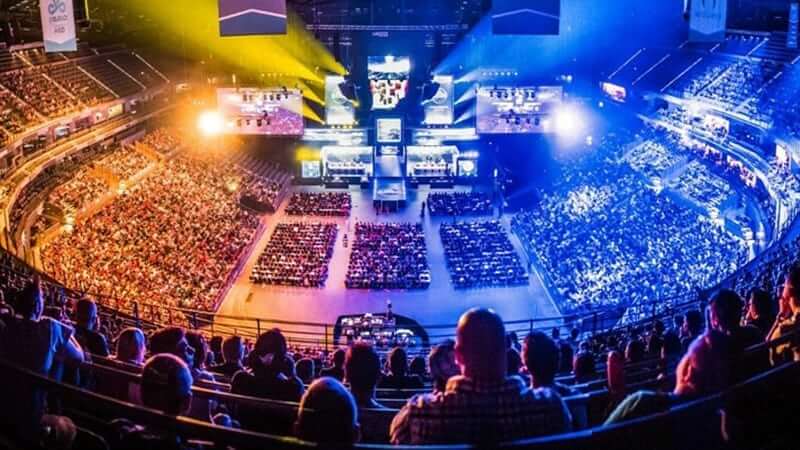
What is Esports and Why do People Watch?
Esports is an encompassing term that describes competitive video gaming but also now the industry that surrounds it and the skill-building path avid gamers follow as they aspire to become professional gamers.
Today hundreds of thousands of esports players compete in thousands of esports tournaments organized at arenas, stadiums, and dedicated new esports facilities around the globe. The most popular game titles played included League of Legends, Dota 2, Counter-Strike: Global Offensive, Overwatch, and Fortnite.

© Dota 2 The International
What is Esports? (Esports Explained)
First, the terminology. Competitive video gaming and esports are essentially the same thing. It means playing Video Games in a competitive format with clearly set rules and a way to determine the winner. Esports is just short form way to say electronic sports.
Gaming as an industry encompasses both Esports, eGaming, iGaming. All three are tied into competitive video gaming and the industries surrounding it. Some of the big games and abbreviations to know would be: CS:GO (Counter Strike Global Offensive), LoL (League of Legends), Dota 2 (Defence of the Ancients), OWL (Overwatch League) and CoD (Call of Duty).
Since there are so many popular esports out there now, it may take a few tries to find the right fit – ask your friends for recommendations if you’re not sure to ask, or some terminology confuses you.
Short History of Esports
Over the decades gaming organisations and groups emerged and by the 1990s brands like Nintendo and Blockbuster Video were organization tournaments. By 2000 and beyond more and more competitive gaming tournaments emerged as networking and internet availability made collaborative and competitive play easier.

Credit: Vending Times
Esports aren’t slowing down and what were originally small LAN tournaments in basements, all the way back in the 1970s are now massive events filling out stadiums. Due to the popularity of gaming and the emergence of online multiplayer games, esports quickly evolved to bigger LAN events, and ultimately, the first properly hosted tournaments appeared. What started out with joke prizes like magazine subscriptions and in-game currency morphed to multi-million-dollar events in just a few years.
By 2010, esports was an important part of the video game industry and the total prize money won by esports players was $5.2 million, by 2016 this figure was $93.3 million. In 2019 over $211 million was awarded in prize money. Esports net worth as an industry also surpassed $1 billion and is expected to be worth three times as much by 2025.
Now, esports news are as common as news about a football player transferring teams or an accident in an F1 race. Esports is now just sports played on a device. Its a huge industry and esports is becoming mainstream.
The Fortnite World Championship Solo in 2019 saw the single winner take home $3 million in prize money. And, audience and brand sponsorship are now growing at such a pace that not only is esports beginning to be viewed as equal to any other popular sport, but esports events can be equally compared to sports events like the Superbowl.
Esports gameplay usually takes place on powerful PCs or consoles but mobile esports games are on the rise. The development of 5G networks globally will only increase the capability of mobile gaming and drive the popularity of mobile esports games and even mobile-based tournaments.
Here’s a short 5-minute video by Sean “Day9tv” Plott explaining esports in a simple way.
What does esports stand for?
Esports, the term coined from “electronic sports”, was reportedly first used in 1999 press release, according to the Online Gamers Association (OGA). It was first incorporated into a major dictionary, Dictionary.com, in 2015. This, as per Digitalist Magazine which also details the variation in terminology and spelling between esports, e-sport, e-sports, and the term cybersport which it visualizes as used more commonly in Russia.
So, what does esports stand for? Esports is a whole new generation of sport involving Millennials and Generation Z in competitive teamplay.

© LoL Esports
How big is esports?
Esports is big business. Esports as an industry is valued at almost $2 billion in 2024, and a yearly growth rate of 20%. Global audiences are now close 600 million viewers, and expected to break the billion mark by 2028.
With video games now becoming a part of the Olympics, media rights being bought for popular video games, and the rapid expansion of mobile games esports into China and South Asia. Esports are no longer a niche industry, but a global giant that only grows in popularity as time goes on.
Why do people watch esports?
Watching electronic sports gameplay is incredibly popular with younger viewers, gamers, and aspiring professional gamers. The popularity of playing video games and watching esports has accelerated the industry’s growth in recent years. It’s also gaining popularity with wider audience demographics. And, traditional sports teams are getting involved with esports in a big way. NHL teams are hosting NHL tournaments, for example. And conventional sports teams are fielding their own esports teams, like Italy’s Juventus football club.
What is esports? Esports is a phenomenon of the digital age. It is to Millennials and Generation Z what football, basketball, baseball, and hockey have been for decades to other generations. It’s an opportunity for fans, players, and commercial participants and it’s now a tenable career aspiration for many youngsters.

Getting started with esports
If you’ve not yet watched any matches and you don’t know where to begin, a good choice is to look at your favorite game and see if there is an esports tournaments for it. Granted if you are a hardcore Candy Crush Sage player, there might be difficulty finding an esports scene for it, but in general plenty of titles are now holding their own competitive scenes. You can also look at Twitch.tv as a platform and identify an esport or esports streamers that can entice you into attaching yourself to a certain game.
When you feel ready, find a match with some casters who provide commentary. They’ll point out important moments, player stats, and anything you need to know to really dig into what’s happening. Pick a team you like the look of and root for them – even if you later discover you like another team better, it gives you an ‘in’ as well.
You can also start out with some previous matches, if you want to pause and rewatch certain plays, either for your own skills, or just to pick up a few terms for your (by now) growing wiki.
Don’t be disheartened if a game that initially interests you turns out to be boring – there are many genres, and there are esports for everyone – if shooters don’t interest you, try a racing game, or a strategy game, or, or, or – there are as many choices as there are tastes!
There are even careers in esports you can pursue, especially if you like what you see.
Finding your place in esports
When trying to pick the esport or game you’re most interested in, make your selection based on what format interests you most. Games like Overwatch have a localized league with location-bound teams much like US baseball teams. If you like rooting for your local team in traditional sports, look into games like Overwatch and Call of Duty who have a league based system based on location.
CS:GO on the other hand has independent teams with multi-national rosters and frequent regional and international competitions rather than a fixed league.
The format of the game itself is also relevant – CS:GO and Overwatch are short and round-based, and don’t rely on too many abbreviations. That makes them easy to follow for non-gamers or those not familiar with the more attention-demanding games like League or even StarCraft. League of Legends, in particular, is THE most popular esport on the planet, so if you are looking to chat to your friends about esports, it is a solid choice, but it’s not as easy to pick up as some others.
Esports FAQ
What is Esports?
Esports is a phenomenon of the digital age. It is to Millennials and Generation Z what football, basketball, baseball, and hockey have been for decades to other generations. It’s an opportunity for fans, players, and commercial participants and it’s now a tenable career aspiration for many youngsters.
Is it esport or e-sport?
Esports is the proper way to say and write. Before 2017, the term was written interchangeably as esport, e-sport, and eSport. Finally, the Associated Press stepped in and set the record straight making “esport” the proper and only term used universally.
What does esports stand for?
Esports, the term coined from “electronic sports,” was reportedly first used in 1999 press release, according to the Online Gamers Association (OGA). It was first incorporated into a major dictionary, Dictionary.com, in 2015. This, as per Digitalist Magazine which also details the variation in terminology and spelling between esports, e-sport, e-sports, and the term cybersport which it visualizes as used more commonly in Russia.
What is an esports team?
Competitions in esports are either team or solo events, or a combination of the two. Fortnite, for example, has Solo, Duo, and four-player Squad events. League of Legends, in contrast, predominantly features team tournaments. Esports teams vary in size and specialty, some focus on just one game whereas larger teams field players in different game titles. Cloud9 is one of the most valuable esports teams and is worth an estimated $400 million.
Why do people watch esports?
Watching electronic sports gameplay is incredibly popular with younger viewers, gamers, and aspiring professional gamers. The popularity of playing video games and watching esports has accelerated the industry’s growth in recent years. It’s also gaining popularity with wider audience demographics. And, traditional sports teams are getting involved with esports in a big way. NHL teams are hosting NHL tournaments, for example. And conventional sports teams are fielding their own esports teams, like Italy’s Juventus football club.












